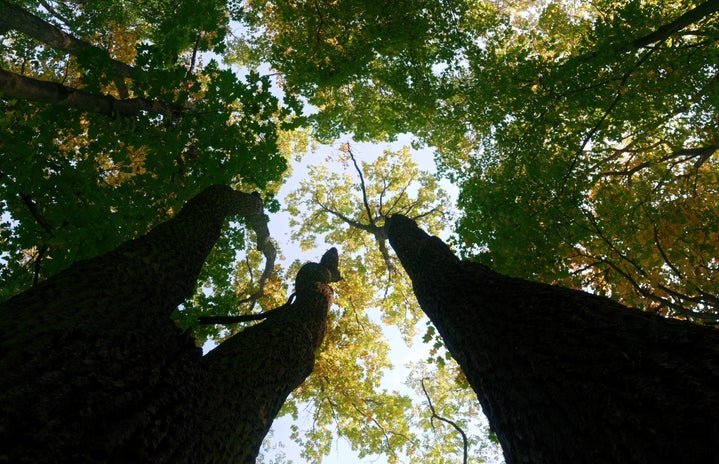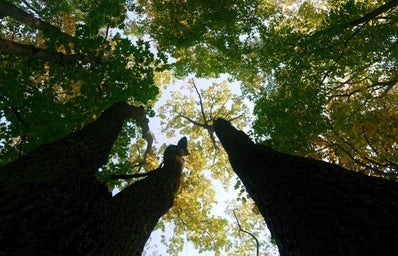Throughout middle school and high school, I swore to my parents, my friends, my teachers, anyone who would listen, that I’d never do anything resembling science.
(Spoiler alert: I made a liar out of myself).
I can’t pinpoint an exact reason for my aversion to STEM-related fields.
Overall, I think I just found it boring in comparison to my English and language classes, which I loved.
This mentality carried me through my junior year of high school.
Before senior year, though, there was a series of events that began with me failing IB Physics and ended with me needing one more science credit to graduate — not the way I wanted to start my last year of high school.
Without many options, I registered for IB environmental science.
On the periphery
I knew a few things about the climate crisis before this class: it was real, it was serious, and it felt too big for me to do anything about it.
I’m definitely a doer—like most people with a Type A personality when I see a problem, I immediately want to solve it.
There was no immediate solution, and I thought I didn’t like science, so it existed on the periphery of my world.
That changed after my first few weeks in my environmental science class.
I’d come in prepared to hate it. Nobody was more shocked than me when I didn’t.
We were expected to do notes outside of class, and (unlike in physics) I actually did them.
I learned about the IPCC. Climate policies in different countries. Natural systems. Water shortages. There was a lot of reading, a lot of writing.
For the first time, science didn’t feel foreign to me, rather immediate and tangible.
Still, after I graduated, sustainability and the climate crisis remained on my periphery. Was I more alarmed about it? Sure. But it was an unproductive form of anxiety, not one that urged me to wallow without acting.
Learning to love the trees
During my freshman year of college, I dabbled in environmental science classes for gen ed requirements.
My major, English, remained separate from my nagging interest in sustainability and the climate crisis.
That didn’t mean I didn’t think about my senior year class or trying to make something more of that interest.
“What if I minor in sustainability studies?” I asked my best friend, who has known me since well before middle school.
“Really?” she replied. “You?”
We laughed, and I thought she was right. Then, a few semesters later, I took a class called Literature of Sustainability and realized she was wrong.
Yes, me.
The idea of the class was simple enough: we would be reading books about sustainability and the climate crisis.
I’d chosen it remembering that I enjoyed my environmental science class senior year.
I didn’t expect for the books we read to change how I viewed the natural world.
One, in particular, The Overstory by Richard Powers, completely altered how I look at trees.
In that book, the human characters took second priority to the myriad of trees and other plants. I’d never read anything like it.
After finishing The Overstory, I remember stopping to look at the trees outside my dorm one day and wondering, how much have you seen?
I think that was the day I learned to love the trees.
Knowing more about the specifics of the climate crisis and what the future would look like without human action to stop it terrified me, but in a different way than before.
Maybe that’s because I was older, more confident overall.
Either way, my fear became anger, motivation, and I wanted to do something.
I decided on a first step: I would add sustainability studies as a second major.
What can I do?
Even after my first step, I still ask myself: what can I do to fight the climate crisis?
We should all be asking ourselves that question.
Maybe you’re thinking, how can my actions alone help?
That response is a trap, though, and one I was stuck in for a long time.
Nobody has to save the world alone, though — that form of stubborn individualism won’t save us.
The answer looks different for everyone.
For me, I try to eat vegetarian four days of the week, bring my own bags when I go shopping and take public transportation, among other strategies.
I look at the trees on campus when I walk to class and appreciate them. I still have a lot to learn, but I’m making it a point to do so.
Beyond those actions, I read. I write. I share.
Between classes, articles and creative writing, I’ve put a lot of words on a lot of pages about the climate crisis, and I know I’ll continue to do so.
We have to talk about it. We have to show that it’s urgent, it’s happening now, and that it’s anything but boring.
It’s almost impossible to conceptualize the scale of it — yet we no longer have the option not to.
One of my most important realizations is that this is a conversation for everyone, not just those dedicated to hard sciences.
We can talk about grey areas and complexities all day, but at the end of the day, it won’t change that, globally, we’re at a turning point in the narrative of the climate crisis.
There are two endings:
The planet will either be inhabitable in the future, or it won’t.
I’m doing my best to make sure it’s the former.
This article is part of an ongoing series surrounding issues of sustainability and the climate crisis.


